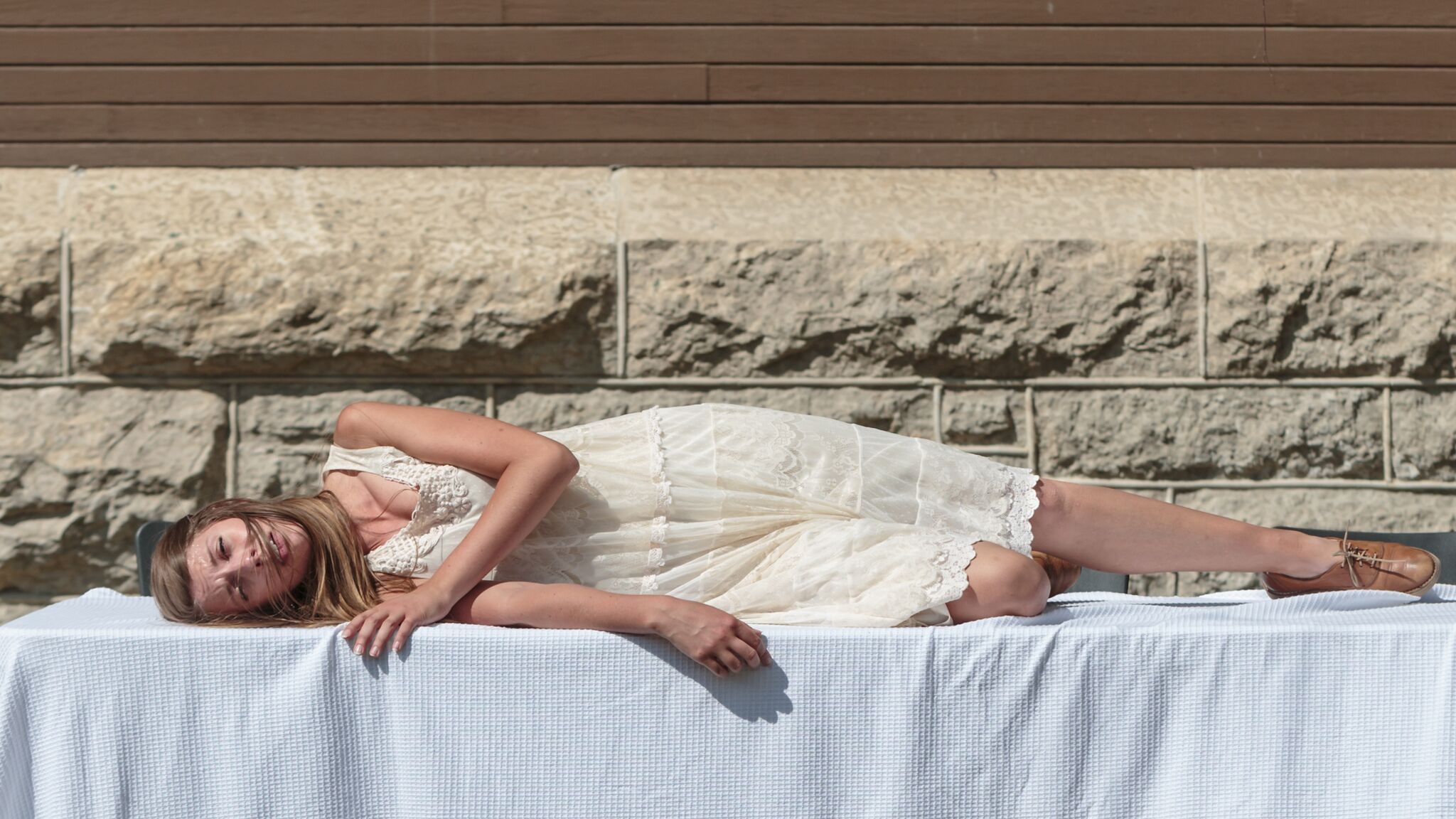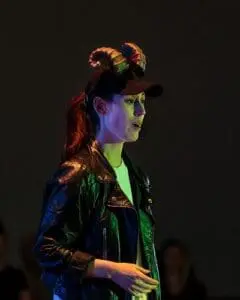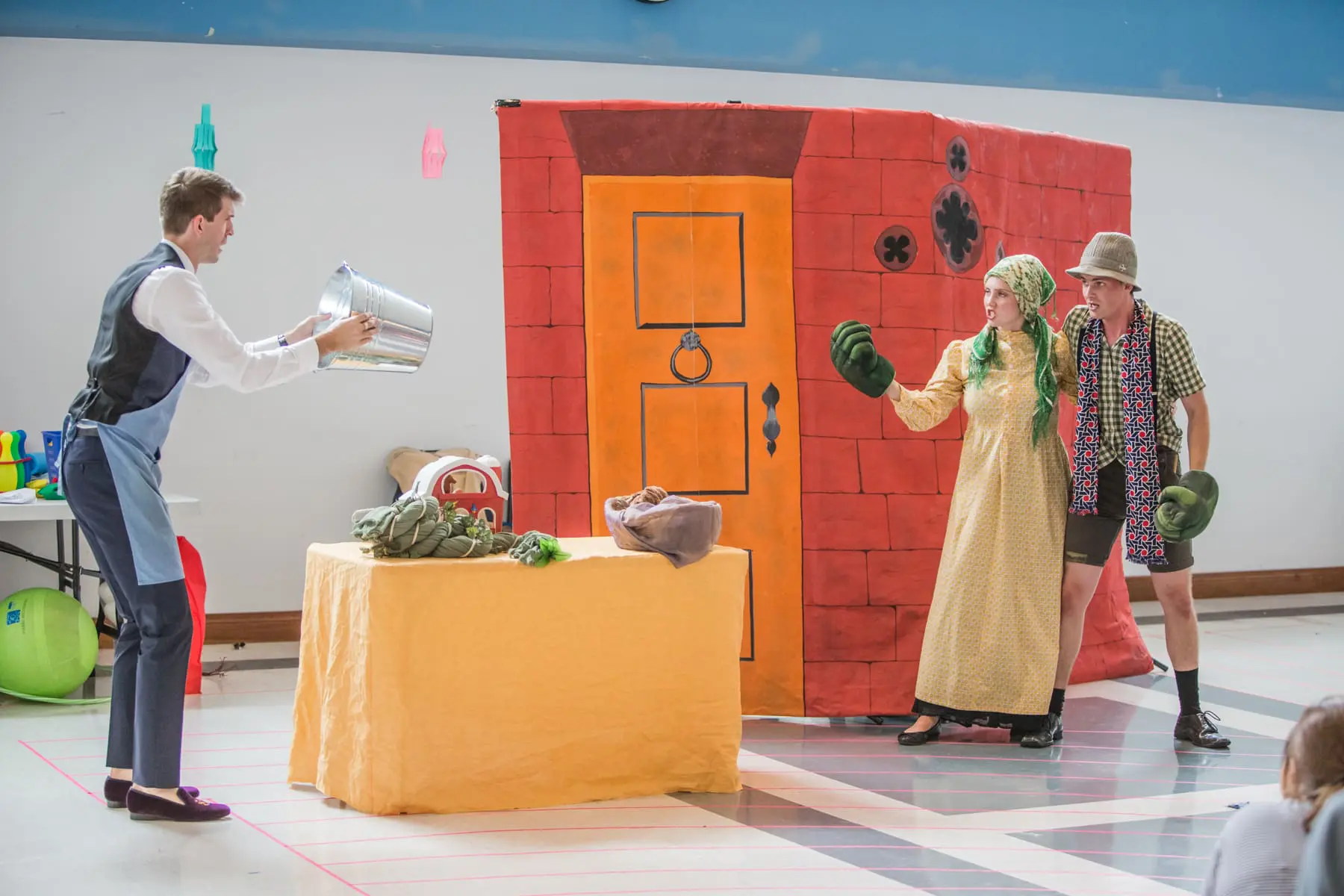Manitoba Underground Opera (MUO) rose again from the netherworld of a frigid Winnipeg winter with an all-new summer festival of site-specific opera. The festival, loosely themed Reflections of Ourselves, was performed in repertory style between Aug. 16th -24th at a variety of local venues.
The troupe, founded in 2008 by Moose Jaw native Brendan McKeen (manager/conductor) and Brenna Corner (artistic director), offered four productions, including an expanded, one-month long provincial children’s tour that rides the coattails of last year’s wonderfully successful presentation of John Davies’s Jack and the Beanstalk.
Manitoba Underground has always taken listeners on both a figurative and literal journey into imaginative opera landscapes. This year, in a program entitled Lost Voices, it whisked four carefully synchronized groups through the hallowed halls of the historic La Cathédrale de Saint-Boniface, situated in the city’s leafy Francophone district.
Co-created by Corner and stage director Sawyer Craig, Lost Voices featured six sopranos joined by as many collaborative pianists tucked away in the nooks and crannies of the basilica, breathing life into six ‘forgotten’ female protagonists across the centuries. It’s a clever concept that mostly worked despite some logistical issues during the opening matinee, including several awkward pauses and the perils of modern day air traffic during the two al fresco scenes.
All six singers have graced Manitoba Underground Opera’s stage before, thus Lost Voices provided a unique opportunity to hear how their voices have flourished over time. One such artist was Emily Diehl-Reader, whose shimmering vocals have grown even more lustrous, as demonstrated her selection of four pieces by Schumann, all telling of love and loss.
One always longs for a stirring performance that will bring a grown woman to tears, and Kinnnon Weddall brought many to that brink—including this writer—with her searing delivery of excerpts from Winnipeg-born composer John Greer’s 2009 song cycle The Red Red Heart. Her final solo, “My Mother’s Hands,” will not soon be forgotten.
Another highlight proved to be Carmen Harris’s wild-eyed performance of Richard Strauss’s Drei Lieder der Ophelia (Op. 67) as she crawled over a covered picnic table outside the
Tyndall stone walls of the Cathedral. Her emotionally volatile portrayal of ‘mad Ophelia’ proved especially harrowing as she presented twigs and gentle violets to palpably nervous audience members during her finale, “Sie trugen ihn auf der Bahre Blosß” accompanied by Lee Houghton Stewart.
Later in the evening we were taken outdoors for a performance by singer Paulina Gonzalez, who channeled the feisty spirit of Mexican operatic soprano/composer Angela Peralta. Gonzalez’s voice rang clear and true during three Spanish songs penned by Peralta: “Io t’amero,” “El deseo,” and “Les larmes” joined by pianist Nicola Davies.
Janice Marpel treated listeners to four Kurt Weill songs, including “Alabama Song,” while her German selections, “Ich bin eine arme Verwandte,” “Ballade von Casars Tod,” and “Denn wie man sich bettet, so liegt man,” showed off a grittier style more firmly rooted in cabaret than pristine concert hall. Meanwhile, Lisa Rumpel’s keyboard vamping created its own sense of expectant danger as listeners entered the dimly lit room.
Ashley Rees was given perhaps the greatest challenge of all, both vocally and dramatically, with Libby Larsen’s The Magdalene, based on the ancient gnostic text Pistis Sophia. Dressed in a toga, Rees’s penetrating vocals supported by pianist Brenden Janzen filled the intimate space, even if better staging and greater movement would have further animated her delivery. Additionally, the English subtitles projected onto a large screen via PowerPoint were unnecessary and detracted from Rees’s strong vocal delivery.
For Whom The Bell™ Tolls
Manitoba Underground also offered arguably its boldest production yet (and that says a lot), with Adam Da Ros’ melding of Purcell’s Dido and Aeneus and Canadian composer James Rolfe’s bracingly contemporary masque, Aeneas and Dido. Viewers were taken on an even deeper, darker dive into the ancient Greek mythological tale and Aeneus’s troubled psyche by daringly shining a spotlight on teenage cliques and bullying; a concept that sometimes worked brilliantly, and other times not.
The 95-minute show, performed in the gymnasium of the Broadway Neighbourhood Centre, featured a cast of strong principals, including mezzo-soprano Elizabeth Hoyt-Surdhar appearing as now popular high school girl Dido, who confides in her best gal-pal, soprano Karen Santos’s Belinda. Her love interest, baritone Paul Winkelmans’s Aeneus, is morphed from Virgil’s original Prince of Troy into a strapping new jock at school, who battles, not fearless warriors from distant lands, but basketball teams vying for sports cups during divisional tournaments. Meanwhile a group of ‘mean girls’ is led by the evil Sorceress/Goat (soprano Meghan Symon) and includes two Witches played by Olivia Kang and Nicki Kirton, rounded out by Sydney Clarke’s Spirit/Mercury and Rebecca Genge as the Second Woman.
The ringing reverberation of the gymnasium presented its own acoustical challenges for the soloists and chorus, often obfuscating the writings of librettist Nahum Tate (Purcell) and Andre Alexis (Rolfe), that stronger enunciation may have helped mitigate. A six-piece chamber orchestra led by Alexandra Dee provided crisp accompaniment throughout to keep things in line.
Themes of technology and the omnipresent siren song of the internet, with its darker underbelly of cyber bullying, became harrowing in themselves. One of the show’s most potent moments came during Dido and Aeneus’s final duet sung into cell phones, which underscored the emotional alienation so rampant among today’s youth (and adults). But even moreso, seeing chorus members share news of Dido’s ultimate suicide with ominous cell phone texts before subsequently reacting in horror trembled with verisimilitude.
The sudden jolt into Rolfe’s contemporary sound-world of tonal clusters just prior to intermission felt shocking—for better or for worse—despite dramatic lighting changes signalling to listeners that we were about to be plunged into a parallel universe. However, once the ear adjusted to this new sonic realm the versatile cast proved its mettle for changing musical styles on a thin dime, including being ricocheted back to Purcell’s kinder, gentler world after one last, luscious (Rolfe) chorus. Director Da Ros rightfully dared not tangle with “When I am laid in earth,” which wisely kept fully intact. Hoyt-Surdhar’s deeply felt performance infused the entire production with aching humanity amidst what often felt an operatic laboratory.
Of Togas and Tots
Manitoba Underground also presented its third children’s opera in as many years. The Three Little Pigs, by American composer/bass-baritone John Davies, is a winsome adaptation of the classic fairy-tale as told through a clever mash-up of Mozart’s The Magic Flute, Don Giovanni, The Marriage of Figaro, and Così fan tutte. The 35-minute production, stage-directed by Vancouver’s Sarah Jane Pelzer, bore testament that the troupe has struck gold with this particular genre; its total of 23 performances, shown across Manitoba, brimmed with an estimated 1,000 children eagerly lapping up, very often, their first taste of opera.
The cast comprised of soprano Janice Marple as the bookish protagonist pig, Despina, alongside soprano Nikita Silagy Labdon (Cherubino) and baritone Adam Kuiack (Don Giovanni) as her siblings, with mezzo-soprano Kelly Robinson appearing as the villainous Wolfgang Bigbad. The cast proved well-matched with collaborative pianist/music director Nicola Davies, and the high-octane show also gently affirmed the intrinsic value of libraries and power of reading, as Despina travels to her local branch to research “huff-proof, puff-proof” home construction.

Adam Kuiack (Don Giovanni), Nikita Silagy (Cherubino), and Kelly Robinson (Wolfgang Bigbad) in MOU’s The Three Little Pigs. Photo: Paul McKeen
It’s a joy hearing perennial classics like Mozart’s “Voi che sapete” and “Una bella serenata” transformed with witty English text to tell this pig tale, all the while instilling real (child-sized) drama. Hearing Robinson’s increasingly forceful “Open the door, pig!” packed as much dramatic punch as the terrifying Commendatore scene from Don Giovanni, and proved this is a Wolf to reckon with.
The full house of toddlers gleefully egged on the pigs during the climactic finale, unaware they were soaking up grand opera by osmosis. No doubt their appetites were whetted for more.
Lastly, the season was rounded out by Brendan McKeen and dramaturge Sarah Jane Pelzer’s adaptation of Handel’s The Triumph of Time and Truth, whittled down from its original, nearly three hour length to a neatly compact, 95-minutes. Despite its reduced skeletal form, the production retained the opera’s narrative arc to a surprising degree. McKeen led a six-piece orchestra at downtown art gallery Cre8ery, which morphed into a glorious whitebox theatre and effective canvas for the four singers. Another surprise came with the cast performing Cardinal Benedetto Pamphili’s libretto in its original Italian, with English dialogue in lieu of recitatives inserted between pieces to keep the allegorical story line humming.
Soprano Sawyer Craig played a Beauty tempted by the power and charms of Pleasure, performed by soprano Carmen Harris. Craig was particularly radiant during her coloratura passages, despite a strangely tentative opening to “Faithful Mirror.”
Further kudos are owed to mezzo-soprano Yujeno Oh, summoned to fill in for an ailing Meghan Symon as Truth, whose knowledgeable portrayal provided balance with her solo “If Beauty loses vagueness,” another highlight.
Harris’s spellbinding “Leave the thorn, gather the rose,” which began as a tender ballad sung to Sawyer before oozing into a power-driven seduction, became its own forbidden fruit, and instilled a fascinating subtext of homoeroticism between Beauty and Pleasure. Her sudden tightening of Beauty’s arm like a cobra’s deathgrip at the end of her solo was hands-down the most heartstopping moment of the entire Manitoba Underground season, with Harris clearly unafraid to go for the emotional jugular during her masterful performance.
Finally, tenor Adam Sperry provided requisite gravitas as Time, as well as ballast for the three women. His rich vocals and dynamic palette were fully displayed during his early “Urns, you who enclose so many beauties,” sung with a world-weary pathos still willing to contemplate the folly of youth.
The ambitions of Manitoba Underground Opera remain untempered as the company also launched its latest initiative: Opera Around Town (OAT), a series of free, live performances from its burgeoning roster of opera singers and collaborative pianists at select businesses around town, sowing seeds into Prairie loam that promise to grow new opera lovers of tomorrow.


















